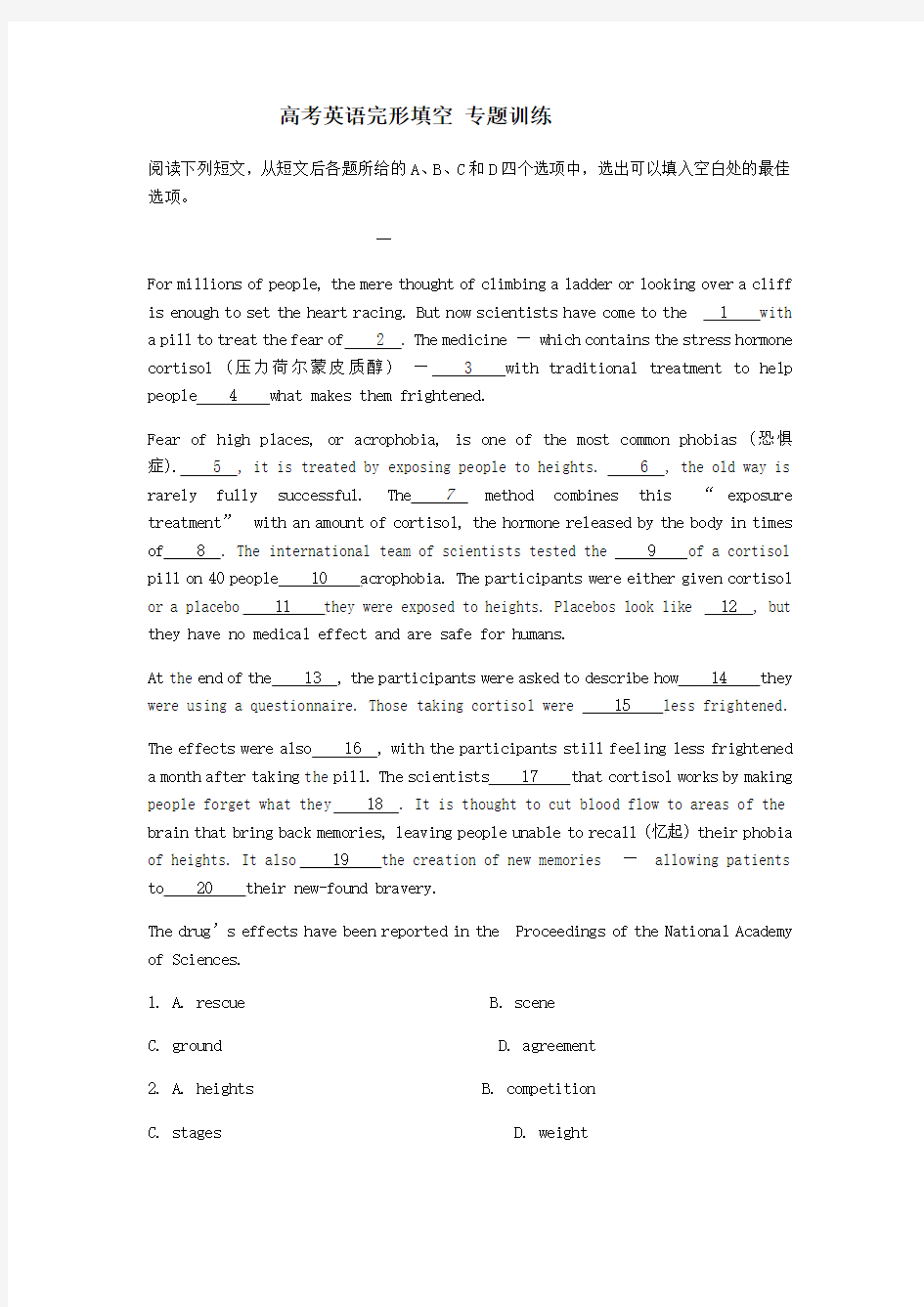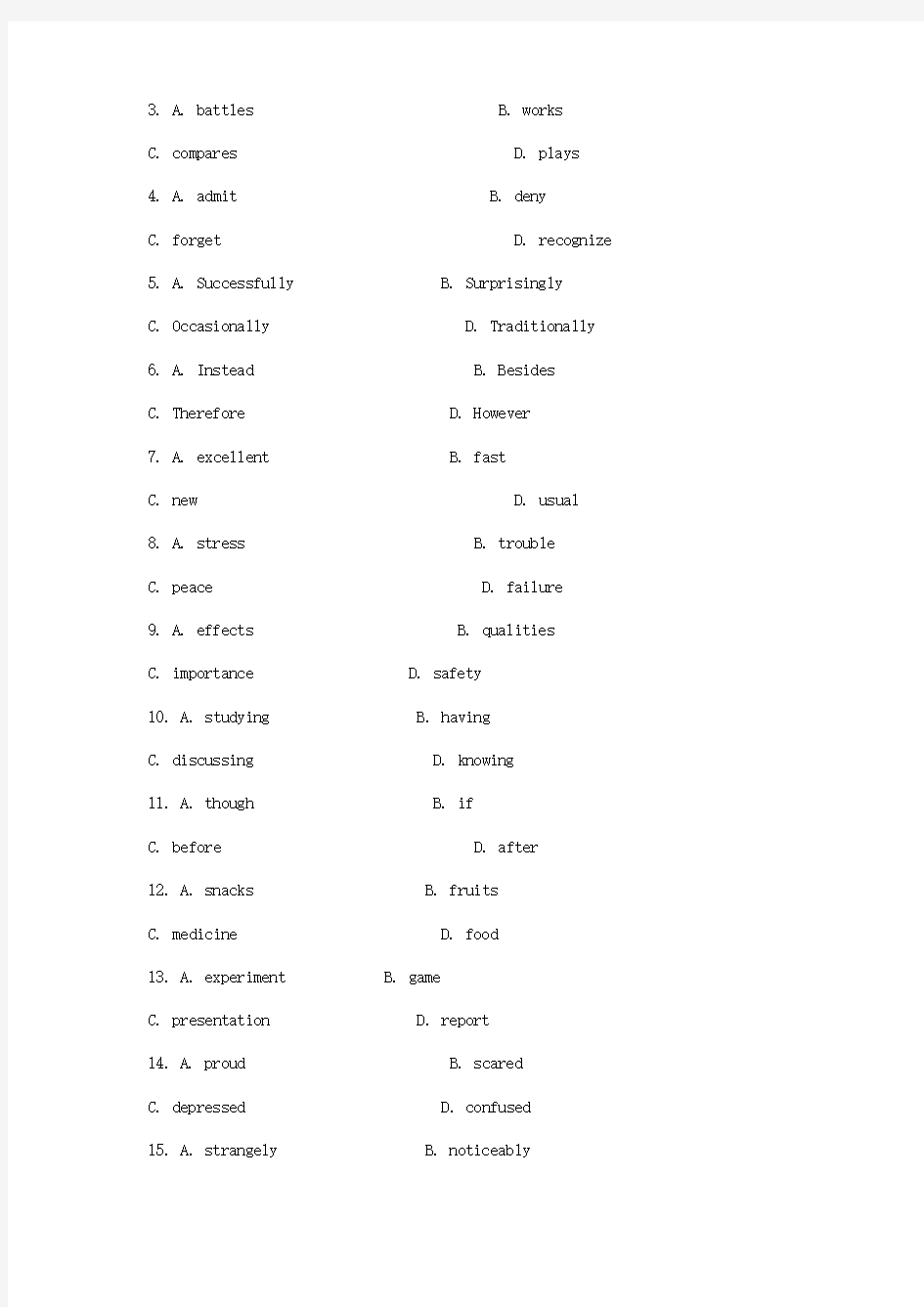

高考英语完形填空专题训练
阅读下列短文,从短文后各题所给的A、B、C和D四个选项中,选出可以填入空白处的最佳选项。
一
For millions of people, the mere thought of climbing a ladder or looking over a cliff is enough to set the heart racing. But now scientists have come to the 1 with a pill to treat the fear of 2 . The medicine — which contains the stress hormone cortisol (压力荷尔蒙皮质醇) — 3 with traditional treatment to help people 4 what makes them frightened.
Fear of high places, or acrophobia, is one of the most common phobias (恐惧症). 5 , it is treated by exposing people to heights. 6 , the old way is rarely fully successful. The7 method combines this “exposure treatment”with an amount of cortisol, the hormone released by the body in times of 8 . The international team of scientists tested the 9 of a cortisol pill on 40 people 10 acrophobia. The participants were either given cortisol or a placebo 11 they were exposed to heights. Placebos look like 12 , but they have no medical effect and are safe for humans.
At the end of the 13 , the participants were asked to describe how 14 they were using a questionnaire. Those taking cortisol were 15 less frightened.
The effects were also 16 , with the participants still feeling less frightened a month after taking the pill. The scientists 17 that cortisol works by making people forget what they 18 . It is thought to cut blood flow to areas of the brain that bring back memories, leaving people unable to recall (忆起) their phobia of heights. It also 19 the creation of new memories —allowing patients to 20 their new-found bravery.
The drug’s effects have been reported in the Proceedings of the National Academy of Sciences.
1. A. rescue B. scene
C. ground
D. agreement
2. A. heights B. competition
C. stages
D. weight
3. A. battles B. works
C. compares
D. plays
4. A. admit B. deny
C. forget
D. recognize
5. A. Successfully B. Surprisingly
C. Occasionally
D. Traditionally
6. A. Instead B. Besides
C. Therefore
D. However
7. A. excellent B. fast
C. new
D. usual
8. A. stress B. trouble
C. peace
D. failure
9. A. effects B. qualities
C. importance
D. safety
10. A. studying B. having
C. discussing
D. knowing
11. A. though B. if
C. before
D. after
12. A. snacks B. fruits
C. medicine
D. food
13. A. experiment B. game
C. presentation
D. report
14. A. proud B. scared
C. depressed
D. confused
15. A. strangely B. noticeably
C. hopefully
D. temporarily
16. A. immediate B. indirect
C. lasting
D. possible
17. A. answer B. question
C. refuse
D. believe
18. A. doubt B. promise
C. value
D. fear
19. A. prevents B. encourages
C. involves
D. proves
20. A. predict B. imagine
C. describe
D. remember
二
Humans, through the ages, have experienced many changes from the time when they lived in dark caves to nowadays when they live in comfortable apartments, 1 one thing remains the same: people always 2 in groups. So why are groups so 3 to people? I think it is because of the psychological, social and financial advantages.
With regard to psychological aspects, I think groups make people feel more purposeful and 4 . When one is lonely and bored, he or she may 5 little purpose in life. But once they join a group that promotes a 6 cause, their life will soon become more purposeful. 7 , a group can give an individual courage to overcome difficulties. Everyone knows the saying, “There is 8 in numbers.” No doubt, meeting challenges as a group is often easier than meeting them 9 .
10 speaking, groups and organizations provide an interesting way for people with common interests to share information, ideas and hobbies. Today, there are 11 social groups, including running groups, culture groups and dance groups. As a group, people can have more fun and can 12 from the collection of different ideas 13 by the group’s many members. I think the saying, “Two heads are better than one.”14 here.
Finally, I think groups are important to people because it allows them to pool their resources (资源) together to make certain things more 15 . For example, many people like traveling in large groups because hotels and airlines are always willing to offer a lower price 16 group business. Many modern suburban neighborhoods have formed car pools to share and lower the 17 of getting to and from the city. There’s 18 to the saying, “It’s 19 by the dozen.”
In conclusion, I think groups and organizations give people psychological, social and financial advantages. No matter how the world 20 , they play an essential role in our life.
1. A. so B. but
C. though
D. unless
2. A. play B. live
C. eat
D. compete
3. A. complex B. simple
C. important
D. normal
4. A. careful B. successful
C. powerful
D. grateful
5. A. collect B. promote
C. waste
D. find
6. A. difficult B. smooth
C. lost
D. worthy
7. A. Besides B. Instead
C. Otherwise
D. Therefore
8. A. mystery B. strength
C. safety
D. patience
9. A. again B. alone
C. apart
D. abroad
10. A. Socially B. Honestly
C. Personally
D. Roughly
11. A. countless B. limited
C. funny
D. actual
12. A. hide B. benefit
C. wake
D. separate
13. A. accepted B. appreciated
C. produced
D. considered
14. A. passes B. ends
C. applies
D. lies
15. A. public B. special
C. official
D. affordable
16. A. in spite of B. in memory of
C. in addition to
D. in exchange for
17. A. cost B. speed
C. chance
D. profit
18. A. truth B. reality
C. principle
D. purpose
19. A. luckier B. quicker
C. cheaper
D. firmer
20. A. works B. tries
C. suffers
D. changes
三
I was on holiday in Cornwall (a county in Southwest England) in August. Suddenly,
while walking in a car park with a friend, I felt really 1 . I was having a serious heart attack, and immediately I 2 . I almost died, there and then, age 47.
As my friend was trying to 3 what was happening, a stranger 4 out of the car park 5 , having seen me on the ground, and asked my friend if I was OK. The stranger and his passenger got out of the car and came over to where I was 6 . They at once 7 what had happened and 8 .
The driver and his passenger were both 9 experts. They were consultants from Plymouth’s A&E (Accident and Emergency) Department at Derriford Hospital. I was also in 10 . The driver happened to have the only piece of 11 that could bring me back to life — a portable defibrillator (电击器) —in his 12 . After three-and-a-half minutes of being 13 , he had me conscious and I was immediately taken to a nearby hospital.
I later learnt from my doctor that he 14 the hospital most days to check on my 15. Apparently, my chances of surviving 16 the intervention (干预) of this stranger and his particular equipment were zero.
Since returning home to Bristol I tracked him down and had a(n) 17 chat with him by phone. I told him how much I 18 what he had done. He said he required nothing in return, and explained why he had a defibrillator that day: he is also the chairman of a South West charity raising money to provide 19 equipment to volunteers.
This 20 with a stranger didn’t just change my life — it gave me my life. Now I’m also hoping to help others in trouble.
1. A. confused B. uncomfortable
C. awkward
D. anxious
2. A. showed up B. turned around
C. fell down
D. set off
3. A. give up B. set down
C. figure out
D. give away
4. A. cycling B. looking
C. walking
D. driving
5. A. shouted B. jumped
C. entered
D. stopped
6. A. resting B. parking
C. lying
D. standing
7. A. realized B. remembered
C. accepted
D. followed
8. A. took over B. took off
C. went on
D. went away
9. A. social B. medical
C. political
D. economic
10. A. doubt B. luck
C. surprise
D. confusion
11. A. advice B. news
C. equipment
D. information
12. A. house B. department
C. office
D. car
13. A. slow B. foolish
C. sad
D. dead
14. A. rang B. helped
C. bothered
D. passed
15. A. recovery B. consciousness
C. accident
D. injuries
16. A. by B. without
C. at
D. after
17. A. honest B. different
C. calm
D. emotional
18. A. ignored B. considered
C. appreciated
D. enjoyed
19. A. long-lost B. life-saving
C. labor-saving
D. high-tech
20. A. incident B. problem
C. challenge
D. trade
四
People have been studying the methods of persuasion since the days of the ancient Greeks. They have found that listeners 1 a speaker’s ideas for two reasons — because they are 2 over by the speaker’s evidence, or because they are moved by the speaker’s emotional appeals.
If you hope to be 3 , you must support your 4 with evidence — examples, statistics, and other facts used to 5 something. As you prepare your speech, try at each point to imagine how your audience will 6 . Just expect their 7 and answer them with evidence. 8 what kind of evidence you use, it will be more persuasive if it is stated in 9 rather than general terms. When making a speech about noise pollution, 10 , you say, “Lots of people suffer from hearing loss.” That will leave the audience 11 how many “lots” amounts to. 12 , by saying “28 million Americans suffer from serious hearing loss,”you will make your point much more 13 .
You can 14 persuade your listeners by appealing to their emotions — fear, anger, pity, sorrow, and so forth. One important way to generate emotional appeals is by using emotional language. 15 you want to move your listeners, use moving language. Mary Fisher, an American political activist, is particularly 16 for her speech on fighting AIDS made in Houston in 1992. It has been regarded as “one of the best American speeches of the 20th century.” As she spoke, the conference hall fell unusually 17 , and many people were moved to tears. They were 18 by Fisher’s powerful words and heartfelt 19 . Afterward, most listeners owed the 20 of the speech to its emotional power.
Even when trying to move listeners to action, however, you should never replace evidence with emotional appeals. You need to build a good case based on facts in